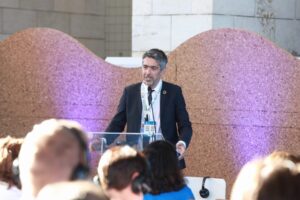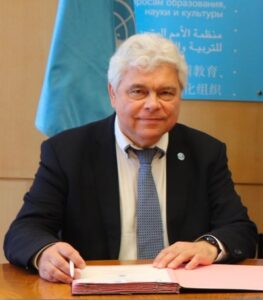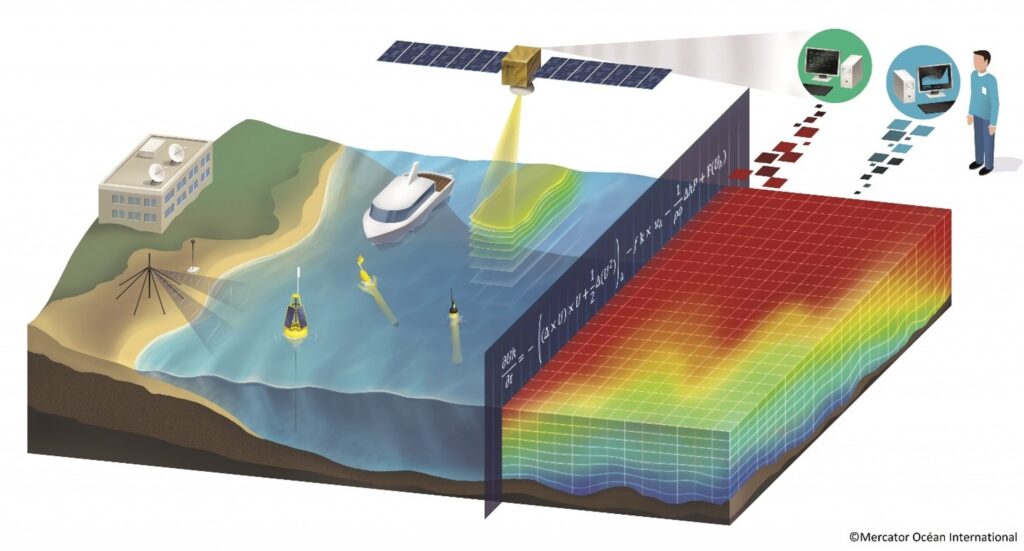On Thursday 30 June, the “Ocean Decade Forum: Launch of the Decade Collaborative Centre for Ocean Prediction” took place in the backdrop of the United Nations Ocean Conference in Lisbon. The United Nations Intergovernmental Oceanographic Commission of UNESCO (IOC) announced the launch of several Decade Collaborative Centres (DCCs) during the event. Among these is the OceanPrediction DCC that will be led by Mercator Ocean International (MOi) and will work to galvanise and coordinate efforts towards the co-development and integration of worldwide ocean prediction activities. It serves the United Nations Decade of Ocean Science for Sustainable Development objectives and is in close collaboration with the Decade endorsed actions and other stakeholders.
The Ocean Decade Forum serves to showcase endorsed decade actions, providing information on their implementation and objectives, and a wide range of partners will make announcements about exciting new commitments.
Mercator Ocean International (MOi) has been at the forefront of developing digital models over the last two decades for the global ocean and regional seas. As a world leader in operational oceanography, MOi provides ocean science-based services and information vital for the conservation and the sustainable management of ocean resources. Advances in operational oceanography over the last decades have revolutionised ocean prediction services, providing crucial information on the current and future state of the ocean.

Pierre Bahurel, Director General of Mercator Ocean International
A Decade Collaborative Centre dedicated to ocean prediction would not only have a coordinating role, bringing together a broad range of user communities to be a part of this incubator and co-design mechanism, but it will also work to deliver. We want to foster an ocean science-to-service approach to develop powerful ocean prediction capacities around the world for a sustainable ocean, giving every citizen on our blue planet the power to understand what is happening or will happen in our ocean, and ultimately to our planet – Pierre Bahurel, Director General of Mercator Ocean International.
The new OceanPrediction DCC is critical to foster evidence-based solutions, contributing to the protection and restoration of marine environments and ecosystems. Ocean prediction services are more than ever needed to support mitigation and adaptation strategies and improve the resilience of coastal communities in the face of climate change and fast evolving marine environments. Leveraging ocean prediction capacities across the globe, the arrival of the Decade Collaborative Centre for ocean prediction (OceanPrediction DCC) comes at a crucial moment.

Vladimir Ryabinin, Executive Secretary, IOC-UNESCO
A key element in sustainable management of the ocean is strong and authoritative ocean prediction, including a digital representation of the ocean. These provide objective means for managing the ocean, increasing the transparency of decisions and our ability to use the ocean in more sustainable ways. This is one of the most important initiatives that we can have in the Decade, which will even spill over the timeframe of the Decade. A Decade Collaborative Centre for Ocean Prediction would serve as an incubator and co-design mechanism for ocean and coastal data processing, forecasting and modelling, culminating in a digital twin of the ocean, and taking ocean science beyond traditional institutional stakeholders
The centre will provide the international ocean forecasting community with a unified voice, rooted in collaboration and co-creation. This will be articulated through creating a global and transversal forum dedicated to ocean prediction activities, connecting the different actors (from coastal to deep sea, nowcast to climate projections, biogeochemical to physical, users to scientists, public to private) promoting the dialogue and the exchange of information. The DCC will work to strengthen ocean forecasting capacities worldwide, promoting these services as key tools for the Blue Economy and as valuable assets for global ocean policy.
The momentum created will also raise ocean literacy and public engagement, while providing standards, best-practices and tools to build an ocean science-to-service global framework centred on the principals of accessibility, interoperability and integration. This technical activity will also be important for the development of the new ocean digital twin concept and the advancement of this vision, which will ultimately permit marine forecasting services to be available worldwide.
More information

